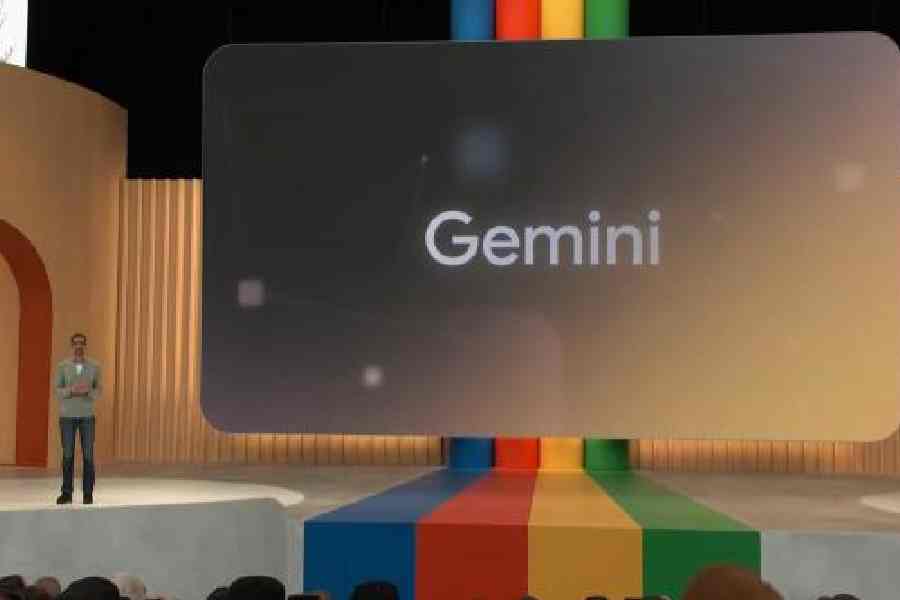Google has released an artificial intelligence model that the company says has advanced “reasoning capabilities” to “think more carefully” when answering difficult questions. Called Gemini, this is a large language model and is being described as a huge leap forward in an AI model that will have an impact on every Google product.
Available to English speakers in more than 170 territories and countries, Gemini has been in the works since the start of the year. Gemini 1.0 is optimised for different sizes: Ultra, Pro, and Nano. “These are the first models of the Gemini era and the first realisation of the vision we had when we formed Google DeepMind earlier this year,” said Sundar Pichai, CEO of Google and Alphabet.
Gemini Nano is meant to run natively and offline on Android devices while Gemini Pro will power lots of Google AI services and is integral to Bard. Gemini Ultra is the most powerful LLM Google has yet created and it is for data centres and enterprise applications. As far as rollout goes, Bard is now powered by Gemini Pro, and Pixel 8 Pro users will get a few new features powered by Gemini Nano. Gemini Ultra is coming next year.
Can it outperform human experts?
The update comes eight months after Google launched Bard and one year after OpenAI launched ChatGPT on GPT-3.5. Earlier in the year, the Sam Altman-led startup launched GPT-4. According to Google, Gemini Ultra outperforms OpenAI’s most capable model, GPT-4, at a number of text-based, image-based, coding, and reasoning tasks. It is currently being refined and is undergoing “trust and safety checks, including red-teaming by trusted external parties,” according to the announcement.
According to Google, the largest version of Gemini exceeds “current state-of-the-art results on 30 of the 32 widely used academic benchmarks used in large language model (LLM) research and development”. The company also claims that Gemini is more scalable and efficient than its previous AI models when run on Google’s custom Tensor Processing Units (TPU). “On TPUs, Gemini runs significantly faster than earlier, smaller and less-capable models,” says Google.
One parameter is very interesting. Google says Gemini Ultra’s score of 90 per cent on the MMLU (massive multitask language understanding; testing knowledge of 57 subjects, like math, physics, history, law, medicine, and ethics) makes it the first AI model to outperform human experts on that benchmark.
Gemini Nano, the smallest version, will power some features on the Google Pixel 8 Pro smartphone, such as summarising audio recordings and offering suggested text responses in WhatsApp.
While OpenAI took the world by storm with the release of ChatGPT last year, Google, which has been creating similar technology for a long time, took a careful approach because it has been reluctant to release a technology that could generate biased, false or otherwise toxic information. When Bard first appeared in March, reviews were just about warm. A month later, the company announced that it had combined its two AI labs — Google Brain and DeepMind — bringing together more than 2,000 researchers and engineers. In May, at its flagship Google I/O conference, Google announced that the new Google DeepMind lab had started developing Gemini.
Google founded Brain Lab in 2011 and in 2014, Google acquired London AI start-up DeepMind for $650m. DeepMind continued to operate largely independently of the Brain lab. In the quest to catch up with OpenAI, Pichai combined the two labs under Demis Hassabis, a neuroscientist who co-founded DeepMind.
Being a large language model, Gemini is trained on billions of images and sentences from the Internet. It’s the technology that powers chatbots, in Google’s case, Bard. For example, Gemini can understand math problems, break them down, and offer ways to solve them. Because AI programmes can build an internal understanding of how different concepts and words connect to one another, it’s good at producing sentences.
Pixel 8 Pro is now more powerful
Gemini Nano is perfect for on-device tasks and is now running on Pixel 8 Pro. It uses the power of Google Tensor G3 to deliver two expanded features: Summarise in Recorder and Smart Reply in Gboard. With the former, get a summary of your recorded conversations, interviews, presentations and more — even without a network connection. Inside your Pixel 8 Pro, Gemini Nano is starting to power Smart Reply in Gboard as a developer preview. Available now to try with WhatsApp and coming to more apps next year, the on-device AI model saves you time by suggesting high-quality responses with conversational awareness.
Mathures Paul










